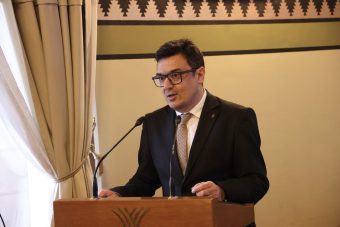
One of the main priorities of the Sarajevo city authorities is the development of the so-called City Climate Contract, which will be submitted to the European Union. The aim of this document is for the functional urban area of Sarajevo – encompassing the City of Sarajevo, the Sarajevo Canton, and the City of East Sarajevo – to obtain the Net Zero Label.
This label confirms the local authorities’ commitment to climate policy and opens up the opportunity to use funds from European Union sources, which is crucial for implementing green projects.
We spoke with Mayor Predrag Puharić about the specific steps Sarajevo is taking in the fight against climate change, how citizens are getting involved in these processes, and how the quality of life in the city is improving.
Q: What measures is the City of Sarajevo taking to reduce air pollution?
A: Although this area does not fall directly under the jurisdiction of the City of Sarajevo, reducing air pollution is one of our key priorities. When we asked citizens a few years ago what the biggest issues in Sarajevo were, they cited air pollution, public transport, and corruption. In response to the public’s concerns, we have taken it upon ourselves to contribute to solving this pressing problem. We address this issue through the activities of the City Department for Sustainable Development, which enables us to implement various measures and participate in projects and initiatives focused on this issue.
Through the Smart City initiative, in cooperation with UNDP BiH, we have implemented innovative ideas proposed by citizens. Across various projects and initiatives, we aim to increase green areas and urban vegetation by planting trees, creating urban gardens, and introducing other innovative methods and concepts. A significant step in this area is the joint application by the City of Sarajevo, the City of East Sarajevo, and the Sarajevo Canton to join the EU Mission of 100 climate-neutral cities. The functional urban area of Sarajevo, as we named this comprehensive region, has become part of the Mission and is one of only three cities from the Balkans to be accepted. We are currently developing an Action and Investment Plan, which will form part of the so-called City Climate Contract, and are preparing the First Citizens’ Climate Assembly/Forum in Sarajevo on this topic.
IN FOCUS:
- Serbia on a Mission to Decarbonize Energy Sector
- EPS Stronger and Greener – Solar Megawatts from Kostolac
- GreenCleanS as a Response to the Environmental Challenges of Oil Regeneration
Q: What are the plans to reduce the number of cars in the city centre?
A: Through the implementation of the Sustainable Urban Mobility Plan, the City of Sarajevo is working on activities that aim to reduce the use of cars and promote alternative, sustainable forms of urban mobility. We support the efforts and fantastic results of the Sarajevo Canton Ministry of Transport in improving public transport, which is crucial for reducing the number of cars in the city.
We are developing and expanding cycling infrastructure and promoting cycling in general. Every year, we actively mark European Mobility Week through a range of activities, including subsidies for citizens to purchase bicycles and organizing Bike2Work days to encourage employees in institutions, organizations, and companies to cycle to work.
We are actively working on establishing supporting infrastructure, including the installation of so-called Mobility Islands at two locations. These features include electric vehicle chargers, anti-theft bicycle stands, smart benches, and scooter parking. We are also systematically installing bicycle parking at schools and universities to encourage both students and staff to cycle. Following European and global trends, we support the introduction of new systems, such as electric bicycle rental services, which will offer citizens another form of sustainable mobility and reduce reliance on cars.
Q: How would you assess the waste collection and recycling system?
A: The recycling segment is still significantly behind modern European standards. Aware of this, the City of Sarajevo is making efforts through numerous initiatives to improve both infrastructure and public awareness. To this end, the City works closely with the cantonal public utility company, Rad, and the electronic waste management operator, ZEOS Eco-System, implementing joint actions and pilot projects for sorting, recycling, and education.
One example is the Re-Use Day, which offered citizens a chance to learn, exchange, and donate reusable items. A Cool Bazaar was also held, where children and young people could exchange and sell their used belongings. By involving children and youth, we aim to educate and raise awareness from an early age, thereby promoting a circular economy.
Interview by Jasna Dragojević
The interview was published in Energy portal Magazine PURE ENERGY.

